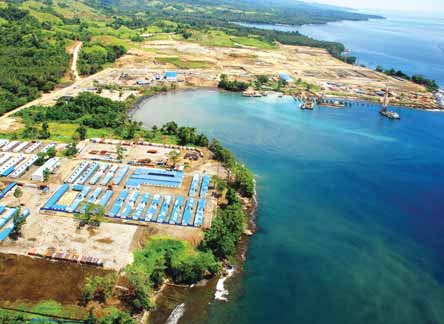Environmental Act amendments revoked to up O'Neill's stakes as PM

The operations site of the Ramu nickel mine in Madang province. Picture courtesy of WOMP
Parliament-elected Prime Minister Peter O’Neill continues to up his popularity stakes when his government yesterday nullified a law which shielded resource companies from environmental damage lawsuits.
Reports from the Papua New Guinea capital Port Moresby indicate that the O’Neill government has revoked the 2010 amendments to PNG’s Environmental Act, which the then Somare government pushed and got parliament to pass to protect the $1.5 billion Chinese-owned Ramu nickel mine.
It is understood MP Thompson Haroquave, who is the environment minister in the O’Neill government, tabled the legislation and was able to get the parliament to vote in favour of the contentious provisions being invalidated.
However, Supreme Court-reinstated PM Sir Michael Somare has vowed to review all of the O’Neill administration’s policies and undertakings “when it gets back into office”.
“At the appropriate time in the near future, my government will review each of these agreements and dealings and ratify or strike out where necessary. It is important, however, that my government remains calm and does not act hastily and prejudice ongoing court proceedings,” said the 75-year-old veteran MP, who has refused to concede defeat in the month-long fight over government legitimacy.
The 2010 amendments by the Somare government were widely criticised and opposed by PNG landowners, who own 97 per cent of land in PNG but following the legislative changes could not sue resource companies for environmental damage.
Civil society in PNG, led by Port Moresby-based advocacy group Act NOW, campaigned against the law and collected over 18,000 signatures in an online petition. They were later joined by Mr O’Neill’s deputy and then Opposition Leader Belden Namah who said the legislation was not in the “national interest”. Another MP linked to the Somare government, Ken Fairweather, also quit and moved to the middle benches in protest against the amendments.
The revoking of the controversial law coincides with Mr O’Neill’s announcement of free public health care after a tour of the Port Moresby General Hospital, PNG’s largest government-funded public hospital. The new health policy as well as the free education policy, which the parliament-elected PM announced last August, has been welcomed by ordinary Papua New Guineans as they battle to overcome some of the region’s worst social indicators.
But the failure by the two camps to compromise could throw the spanner in the works with PNG political scientist Dr Henry Okole, in a recent appeal to Sir Michael and Mr O’Neill to end the political stalemate, asked whether the reversal of some of the O’Neill government’s policies could have implications for PNG.
“Among the key undertakings to be funded and implemented is the free-education policy, something that has captured the heart and imagination of ordinary Papua New Guineans. What would be the implications if such policies were reversed?” he said.
The amendments' revoking comes a month after the PNG Supreme Court rejected an appeal by landowners to stop the Ramu nickel mine from dumping its waste off the coast of Madang in the north of PNG.
